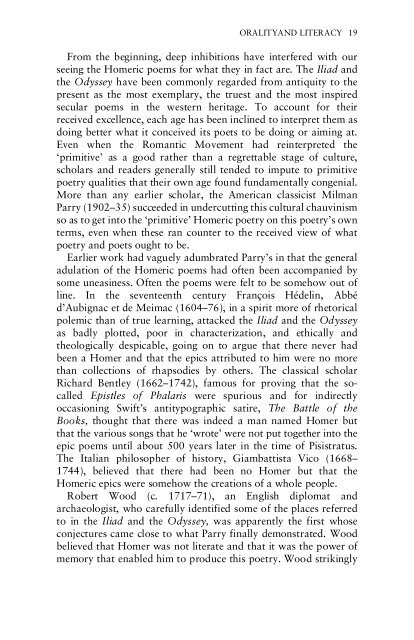Orality and Literacy: The Technologizing of the Word - Monoskop
Orality and Literacy: The Technologizing of the Word - Monoskop
Orality and Literacy: The Technologizing of the Word - Monoskop
You also want an ePaper? Increase the reach of your titles
YUMPU automatically turns print PDFs into web optimized ePapers that Google loves.
ORALITYAND LITERACY 19<br />
From <strong>the</strong> beginning, deep inhibitions have interfered with our<br />
seeing <strong>the</strong> Homeric poems for what <strong>the</strong>y in fact are. <strong>The</strong> Iliad <strong>and</strong><br />
<strong>the</strong> Odyssey have been commonly regarded from antiquity to <strong>the</strong><br />
present as <strong>the</strong> most exemplary, <strong>the</strong> truest <strong>and</strong> <strong>the</strong> most inspired<br />
secular poems in <strong>the</strong> western heritage. To account for <strong>the</strong>ir<br />
received excellence, each age has been inclined to interpret <strong>the</strong>m as<br />
doing better what it conceived its poets to be doing or aiming at.<br />
Even when <strong>the</strong> Romantic Movement had reinterpreted <strong>the</strong><br />
‘primitive’ as a good ra<strong>the</strong>r than a regrettable stage <strong>of</strong> culture,<br />
scholars <strong>and</strong> readers generally still tended to impute to primitive<br />
poetry qualities that <strong>the</strong>ir own age found fundamentally congenial.<br />
More than any earlier scholar, <strong>the</strong> American classicist Milman<br />
Parry (1902–35) succeeded in undercutting this cultural chauvinism<br />
so as to get into <strong>the</strong> ‘primitive’ Homeric poetry on this poetry’s own<br />
terms, even when <strong>the</strong>se ran counter to <strong>the</strong> received view <strong>of</strong> what<br />
poetry <strong>and</strong> poets ought to be.<br />
Earlier work had vaguely adumbrated Parry’s in that <strong>the</strong> general<br />
adulation <strong>of</strong> <strong>the</strong> Homeric poems had <strong>of</strong>ten been accompanied by<br />
some uneasiness. Often <strong>the</strong> poems were felt to be somehow out <strong>of</strong><br />
line. In <strong>the</strong> seventeenth century François Hédelin, Abbé<br />
d’Aubignac et de Meimac (1604–76), in a spirit more <strong>of</strong> rhetorical<br />
polemic than <strong>of</strong> true learning, attacked <strong>the</strong> Iliad <strong>and</strong> <strong>the</strong> Odyssey<br />
as badly plotted, poor in characterization, <strong>and</strong> ethically <strong>and</strong><br />
<strong>the</strong>ologically despicable, going on to argue that <strong>the</strong>re never had<br />
been a Homer <strong>and</strong> that <strong>the</strong> epics attributed to him were no more<br />
than collections <strong>of</strong> rhapsodies by o<strong>the</strong>rs. <strong>The</strong> classical scholar<br />
Richard Bentley (1662–1742), famous for proving that <strong>the</strong> socalled<br />
Epistles <strong>of</strong> Phalaris were spurious <strong>and</strong> for indirectly<br />
occasioning Swift’s antitypographic satire, <strong>The</strong> Battle <strong>of</strong> <strong>the</strong><br />
Books, thought that <strong>the</strong>re was indeed a man named Homer but<br />
that <strong>the</strong> various songs that he ‘wrote’ were not put toge<strong>the</strong>r into <strong>the</strong><br />
epic poems until about 500 years later in <strong>the</strong> time <strong>of</strong> Pisistratus.<br />
<strong>The</strong> Italian philosopher <strong>of</strong> history, Giambattista Vico (1668–<br />
1744), believed that <strong>the</strong>re had been no Homer but that <strong>the</strong><br />
Homeric epics were somehow <strong>the</strong> creations <strong>of</strong> a whole people.<br />
Robert Wood (c. 1717–71), an English diplomat <strong>and</strong><br />
archaeologist, who carefully identified some <strong>of</strong> <strong>the</strong> places referred<br />
to in <strong>the</strong> Iliad <strong>and</strong> <strong>the</strong> Odyssey, was apparently <strong>the</strong> first whose<br />
conjectures came close to what Parry finally demonstrated. Wood<br />
believed that Homer was not literate <strong>and</strong> that it was <strong>the</strong> power <strong>of</strong><br />
memory that enabled him to produce this poetry. Wood strikingly

















